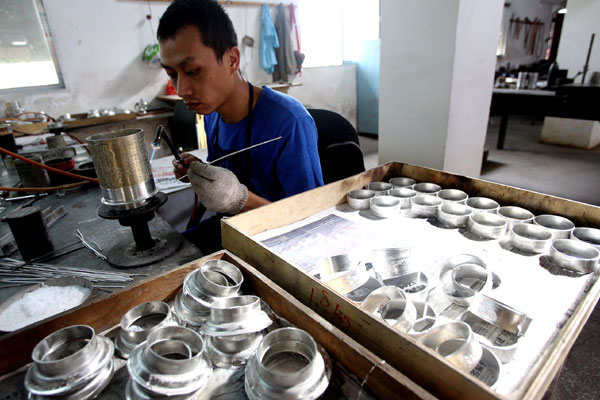Tin city explores economic shift
Updated: 2013-09-02 10:08Mining industry has caused heavy metal pollution and desertification, reports Hu Yongqi in Gejiu, Yunnan province
Peng Jianguo was giving instructions to his employees in the metals recycling unit at a new facility in Gejiu, Yunnan province, site of 24 percent of the world's tin deposits.
 |
|
A worker makes products from tin at a factory in Gejiu. Photos by Zhang Wei / China Daily |
Peng, deputy general manager of Green Novo, said the factory has been extracting metals from the dust particles discharged by iron and steel plants since 2003. Annual tin production has increased to 40,000 metric tons, a rise of 50 percent from two years ago.
"The company has eight collection centers around the country. Our goal is to recycle the metals and reduce pollution as much as possible," said Peng.
In the facility, the dust undergoes five procedures, such as ore dressing - separating the metal from the dust - and kiln smelting, to recycle iron, tin and zinc.
In the warehouse, containers of tin blocks were lined up and ready to be loaded onto trucks. Iron and steel plants are eager to work with Peng's company, which helps them dispose of their industrial waste and reclaims iron and other metals.
Iron waste, once a burden to manufacturers, has become a precious resource for Green Novo, which holds seven patents in metal recycling and has annual revenue of 4 billion yuan ($654 million), said Peng.
Two years ago, Green Novo moved to its current site, aided by favorable policies such as tax concessions and land offered by the government of Gejiu, the former capital of Honghe Hani and Yi autonomous prefecture in Yunnan province.
The city is internationally renowned for its huge tin deposits and the metal has been a pillar of the local economy since it was first discovered there during the Eastern Han Dynasty (AD 25-220). Gejiu was ranked among the top 10 county economies in western China in 2012.
However, while mining has brought prosperity, it has also resulted in long-term problems, especially heavy metal pollution and rocky desertification.
"Currently, Gejiu has more than 200,000 tons of tin deposits and the local mines can produce 30,000 tons each year. That means tin mining can only survive for the next decade, or 20 years at the most," said Wang Yongchang, director of the Gejiu Development and Reform Bureau. "What if all the mines run out of reserves? Identifying the next growth engine for the local economy is a serious question on our agenda."
In 2008, Gejiu was chosen by the State Council as one of the first batch of 12 resource-exhausted cities that must transform their unsustainable economies. However, the mining of non-ferrous metals still accounts for 70 percent of the locality's economic output, according to the local development and reform bureau. The financial support provided by the central government will cease in 2015, but the transformation process will take far longer to complete.







